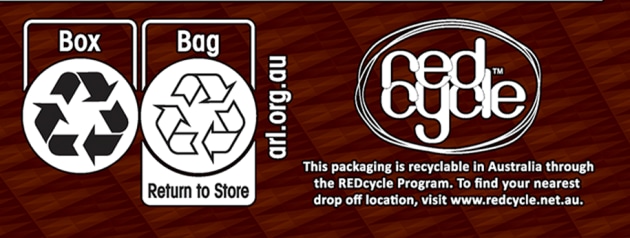Kellogg has added an updated recycling label across its breakfast brands in retail stores, with the roll out to be completed in June.
Kellogg has always used the Australasian Recycling Label (ARL) on pack and says that with the addition of an in-store drop off label, which is positioned beside the recycling label and REDcycle logo, recycling the packaging is even easier.

Together, all three labels provide simple recycling information to help consumers understand how and where to recycle the packaging – whether that’s kerbside or through a REDCycle drop off location at supermarkets.
“We’re committed to making our packaging 100 per cent recyclable, reusable or compostable by 2025. We’re utilising innovation in sustainable packaging so we can deliver products to our customers that have minimal waste and can be recycled over and over,” said David Roberts, packaging development manager at Kellogg Australia.
Roberts says that a number of factors prompted Kellogg to move to the label change.
“At Kellogg, we’re focused on creating 'Better Days' for Aussies and Kiwis every day by reducing our environmental impact and increasing our social impact. Our ongoing sustainability efforts have seen us make changes to the way we produce, develop, and deliver our products.
“Initiatives and changes like these help to educate Aussies on the correct waste stream for their recyclables. Our recent ARL logo format change, alongside the work APCO is currently undertaking is having direct results on recycling habits, which help to ensure our packaging is kept out of landfill.”
Roberts says that Kellogg is always looking for new ways to innovate and improve its business and make progress against its commitment of 100 per cent recyclable, reusable, or compostable packaging by 2025.
“We will ensure we are consistent across our all our brands, so it’s simple for our consumers to navigate our packaging and easily find the recycling information that they’re looking for.”
Roberts confirms that Kellogg plans to roll out the new ARL packaging across its entire cereal range.
“The new design is already on Sultana Bran, Nutri-Grain and Special K, and we are working to update the remainder of our brands by June 2022,” he said.
“As a global company, we work alongside our other markets, with a local and global lens. We are focused on continuous improvement in order to deliver our long-term goals.
“Driving sustainability is always at the forefront of our business – we’re always looking for new and innovative ways to improve. Rolling out the ARL on our packs is so important, we want all consumers to know our packaging is 100 per cent recyclable and understand how to recycle each box. It’s important we also raise awareness and encourage improvements in consumer recycling habits.
“We are on track to reach the Australian Packaging Covenant Organisations 2025 National Packaging Targets as well as Kellogg’s commitment to have 100 per cent reusable, recyclable, or compostable packaging by this time.”
Kellogg Australia was recently recognised for Sustainable Packaging Excellence and for working toward a greener future by converting to a renewable packaging format. This addition aligns with Kellogg’s sustainability commitment of creating Better Days for all by ensuring 100 per cent recyclable, reusable or compostable packaging by 2025.






